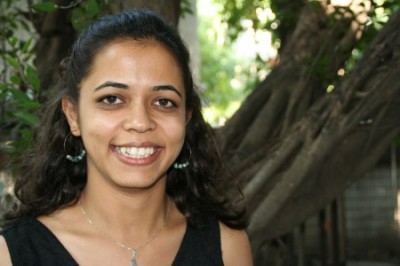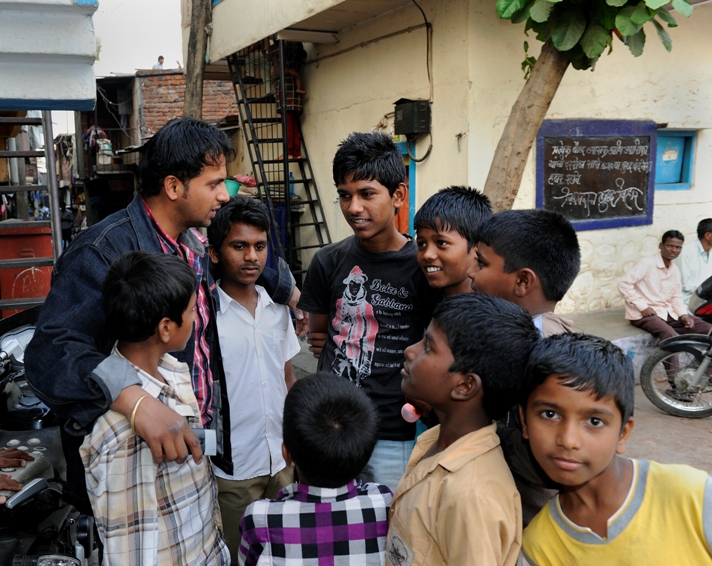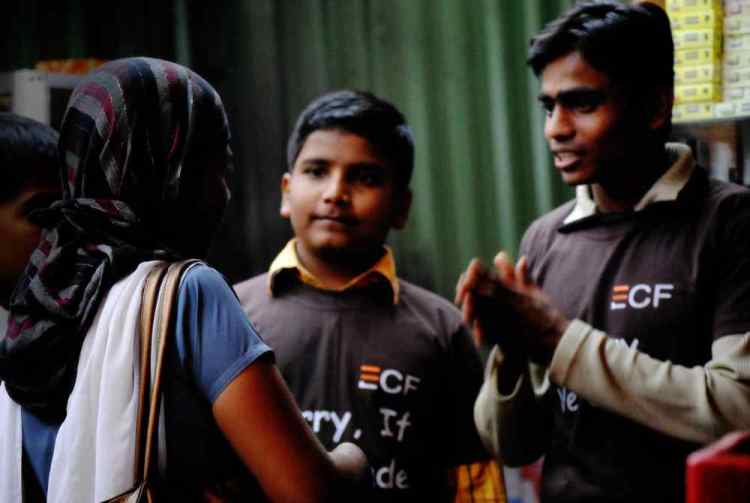 On International Men’s Day, W4 celebrates the boys and men across the globe who are standing up to defend girls’ and women’s human rights, along with organizations—such as Equal Community Foundation in India—that are working tirelessly to engage a greater number of boys and men in the movement to eradicate gender discrimination and gender violence.
On International Men’s Day, W4 celebrates the boys and men across the globe who are standing up to defend girls’ and women’s human rights, along with organizations—such as Equal Community Foundation in India—that are working tirelessly to engage a greater number of boys and men in the movement to eradicate gender discrimination and gender violence.
Helping men, women and children to flourish across the vast city of Pune (the second largest metropolis, after Mumbai, in India’s state of Maharashtra), the Equal Community Foundation (ECF) is an inspiring example of an organization actively focusing on boys and men in its initiatives to empower local girls and women. Founded in 2009 by William Muir, ECF is encouraging the young men living in twenty low-income urban communities—where women typically experience some degree of discrimination and violence and are routinely denied healthcare and education—to question and challenge common gender stereotypes, attitudes, and behaviors that lead to egregious inequality.

W4 recently interviewed Rujuta Teredesai Heron, Program Manager at ECF and one of the organization’s pioneering members. Rujuta has been involved in various organizational functions –program design and management, team building—and is now managing fundraising and communications.
Working in tandem with local women’s rights organizations, ECF is currently implementing its ‘Action for Equality’ project – an initiative that sprang from the realization that the efficacy of local efforts to end gender discrimination and violence in the area depends heavily on boys’ and men’s participation and cooperation. As Rujuta explains: “A partner organization once told us that one of their beneficiaries had come to them and said, ‘It’s great that you’re giving me all this information on violence and teaching me about the importance of being financially independent, but what about my husband who takes all of my money away from me when I get home? Why don’t you work with him – with men?’”
Action for Equality does just that, with a well-grounded strategy for promoting sustainable behavioral change among local young men based on a five-stage model: 1) Engage, 2) Enroll, 3) Retain, 4) Facilitate, and 5) Maintain Behavior Change.
 The program’s first component is the ‘Graduate Program’, which, Rujuta notes, aims to “identify and train male field trainers, or ‘Program Mentors’,” who then go into the community and educate and train adolescent boys through films, songs, games, etc. based on the unique curriculum designed by ECF. “[The program mentors] deliver the training, but at the same time they [also] coach the young men into a process of behavior change in which they’re encouraged to take personal and collective action to support the women in their lives.” Rujuta emphasizes that the program’s success lies in its dynamic and thoughtful method of engaging with the young men. “We never walk into a community and start talking about gender inequality, violence or anything like that. We refrain from using these big words. We do not accuse men. We do not work with them as perpetrators of violence. We frame our program as an opportunity for young men to change themselves and the people around them. The reason being, we recognize the fact that men too are the victims of this inequality.”
The program’s first component is the ‘Graduate Program’, which, Rujuta notes, aims to “identify and train male field trainers, or ‘Program Mentors’,” who then go into the community and educate and train adolescent boys through films, songs, games, etc. based on the unique curriculum designed by ECF. “[The program mentors] deliver the training, but at the same time they [also] coach the young men into a process of behavior change in which they’re encouraged to take personal and collective action to support the women in their lives.” Rujuta emphasizes that the program’s success lies in its dynamic and thoughtful method of engaging with the young men. “We never walk into a community and start talking about gender inequality, violence or anything like that. We refrain from using these big words. We do not accuse men. We do not work with them as perpetrators of violence. We frame our program as an opportunity for young men to change themselves and the people around them. The reason being, we recognize the fact that men too are the victims of this inequality.”
The young men and their mentors develop a strong rapport as they meet for a total of 45 hours over a 15-week period, learning about and discussing problems that affect the women in their communities and tracking their progress towards their goal of constructive behavioral change, as defined independently by each young man in his ‘Personal Action Plan’.
 After these 15 weeks, the young men are expected to take collective action to support women in their community. “It is a way to begin a positive dialogue between men and women,” says Rujuta, “which accelerates a good behavioral change in men. However, this is difficult to sustain over a long period of time.” Transforming ingrained attitudes is, of course, no easy task – particularly when working with adolescents. Rujuta adds that in order to reinforce and sustain the positive behavior change in men, continued opportunities must be provided for them to practice the new-found pattern of behavior. The Alumni Action Program, the second component of the Action for Equality Program, builds on this finding and provides opportunities for graduates to volunteer to develop, prepare, and deliver interactive and multimedia community activities on the various issues and aspects of life that help in the endeavor to end violence and discrimination against women in their communities.
After these 15 weeks, the young men are expected to take collective action to support women in their community. “It is a way to begin a positive dialogue between men and women,” says Rujuta, “which accelerates a good behavioral change in men. However, this is difficult to sustain over a long period of time.” Transforming ingrained attitudes is, of course, no easy task – particularly when working with adolescents. Rujuta adds that in order to reinforce and sustain the positive behavior change in men, continued opportunities must be provided for them to practice the new-found pattern of behavior. The Alumni Action Program, the second component of the Action for Equality Program, builds on this finding and provides opportunities for graduates to volunteer to develop, prepare, and deliver interactive and multimedia community activities on the various issues and aspects of life that help in the endeavor to end violence and discrimination against women in their communities.
Young men who have completed the Graduate Program are recognized as ‘alumni’ and are encouraged to volunteer regularly within the community, which helps to develop their leadership skills while also promoting and sustaining the idea of gender equality among their families, peers and fellow alumni. ECF hopes to expand its group of alumni in order to create a larger, mutually-supportive network of gender-conscious men who can influence others within the community. Eventually, this will enable ECF to build the men’s capacities to continue this work in the future even in the absence of ECF.
The Equal Community Foundation’s decision to follow the ‘less-travelled road’ to women’s empowerment, by focusing on young men, appears to be paying great dividends in the communities they serve. The organization measures its impact by interviewing the men’s mothers and sisters, both at the end of the program and after a further six months. During these interviews, many mothers and sisters have jointly rejoiced over the fact that their sons and brothers have begun helping with domestic chores and in the running of traditionally women-led family businesses. The mother of one graduate expressed her elation after her son stood up to his alcoholic father and demanded that he stop his excessive drinking and abusive behavior towards his mother. “He confronted his father for the first time,” Rujuta recounts, “and he said, ‘It’s not ok for you to come home drunk, create chaos and hit my mother.’ Since then, his father has stopped coming home drunk. From the mother’s point of view, she sees [the program] as absolutely invaluable because she now feels valued by her son and sees that he cares for her.” Indeed, Rujuta explains that, in 2011, 47% (almost half!) of the women living with the program’s graduates reported a reduction in their experiences of violence or discrimination.
“There’s one particular street in the slum where there’s a group of boys who always sit and harass women by either making rude comments or touching them inappropriately. A group of girls came to us and said, ‘Our parents tell us to look down, to keep walking, and to just try to ignore them, but I like your approach because it’s not my fault that these men are harassing me. It’s their fault. They are doing something wrong, so you should talk to them. That’s the best approach.’ And it’s really encouraging to hear that kind of reaction from the women and girls in the community,” Rujuta beams.
The organization is now looking to propagate its model in the hope that it will be successfully replicated by other organizations in different communities. “ECF’s mission is to empower every man in India with an opportunity to end violence and discrimination against women,” Rujuta says. “For that to happen we need more organizations and professionals to adopt the approach of empowering men to empower women.” Indeed, through regular ‘Training of Trainers’ seminars and sector research, ECF has already started sharing its methods and best practices, which it has been able to develop thanks to extensive fieldwork and research, with other local community-based organizations in Pune.
We invite you to learn more about Equal Community Foundation’s innovative model and to discover how you can support their crucial work to end violence and discrimination against girls and women by visiting their website or connecting with their team on Facebook.
© Women’s WorldWide Web 2012













